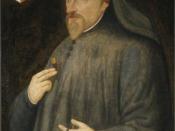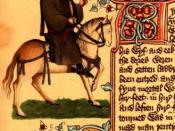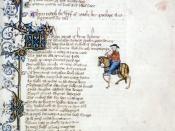Although delaying the Merchant's tale, the digression adds humour and anticipation for the tale of the Merchant; while positioning us for interpretation of the tale. It is also a rebuttal of what has come before. At the beginning of 'The Merchant's Tale', Chaucer deviates from the story in order to praise marriage and to raise the question of the purpose of marriage. This could be interpreted as Chaucer's personal opinions of marriage or it may be a literary device, using heavy sarcasm and irony to emphasise the point of view of the Merchant. Chaucer may also have used this deviation from the story to contrast the Merchant's Tale to the other marriage tales in 'The Canterbury Tales'. The Wife of Bath has previous to the merchant told her own tales of her experiences of marriage, having been married five times; stories of bullying and sexual blackmail, and yet in contrast to this she tells a tale of a fairy-tale marriage.
The Clerk, following the Wife of Bath, tells the tale of a long-suffering wife named Griselda. 'The Merchant's Tale' leads directly on from the Clark; 'We wedded men liven in sorwe and care' - a tale of marital suffering from the perspective of the husband.
Through this false view of marriage, the audience realises that on the surface, this digression from the tale is a naively exaggerated description of marriage as being the right thing to do in God's eyes. However 'The Merchant's Tale' is shown to be many-sided in that the Merchant expresses some of the more selfish ideas of marriage as being convenient for a man in terms of sexual gratification. The Merchant also states through the Tale that a wife would nurse her husband when he was ill and that she would provide her husband with...



Excellent Job!
Nice Job, but please watch out for passive voice words: is-were-was-when-be-been-being. They will make an essay sound less exiting. Another thing, when you go into college, they will ask you to eliminate ALL passive voice words so it's good practice!
0 out of 0 people found this comment useful.